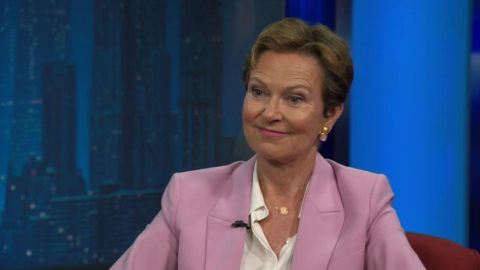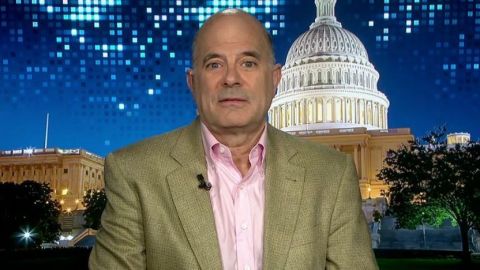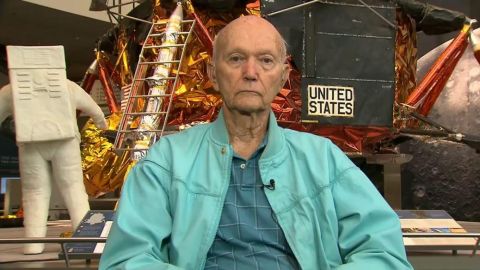Read Transcript EXPAND
AMANPOUR: The success of NASA’s Apollo missions to the moon was driven by the Cold War between the United States and then Soviet Union. And the Soviets had made many milestones before the USA got there. Our next guest grew up in communist Hungary at that time, but she was forced to flee to America when her parents who were journalists were thrown
into jail. Our Walter Isaacson spoke to author and journalist, Kati Marton, about that pivotal time about the legacy of her late husband, the legendary diplomat, Richard Holbrooke, and about the political climate that fueled that infamous blast off.
WALTER ISAACSON: Kati, welcome to the show.
KATI MARTON, AUTHOR AND JOURNALIST: Thank you, Walter. Delighted to be here.
ISAACSON: We’re talking about the anniversary of the moon landing, where were you when you first found out?
MARTON: So I was a teenager. I was watching. I was gathered in front of America’s hearth, which was Walter Cronkite, and CBS Evening News, my parents’ ritual, and we sat there and we were relatively new arrivals to this country. I did not speak English as well as I think I speak now. And we watched with all the pride of new Americans. And when Uncle Walter removed his glasses, we knew that this was a historic moment and that he was as moved as we were because the only other time he had done that was on November 22nd, 1963 — JFK’s tragic death. And that was such a memorable moment and I was proud to be an American.
ISAACSON: It was interwoven with the Cold War.
MARTON: Yes.
ISAACSON: And in our competition with Russia, and more than anybody I know, you have a family history that deals with the Cold War starting with your parents.
MARTON: Yes. Unfortunately, sometimes I think, a little too much history. But yes, I am a child of the Cold War. My parents were in an active state sponsored terror. My parents were arrested when I was six years old on fake charges. They truly were fake charges of being C.I.A. agents. They were — my mother and father were the last independent journalists behind the Iron Curtain.
ISAACSON: In Hungary?
MARTON: In Hungary, in Budapest, yes. And I did not see my dad for almost two years and my mother for a whole year and we were not well-known at all, but the story of my parents arrest was front page news, especially “The New York Times” and as a result, the State Department made all nonessential travel to Hungary prohibited.
MARTON: So, as a way to pressure the communist government of Hungary to release my parents, the result of this coverage of my sister and me as being kind of political orphans with offers to adopt us by you know, sort of average readers of American newspapers. And when we finally made it to these shores, we came on a refugee plane and we landed in an Army base on the New Jersey Turnpike — Camp Kilmer. And the Marine who processed me, a little tyke, noticed that it was my birthday. And from some place, he produced a silver dollar. And by the end of the day, I had six silver dollars, which my mother kept. I wish I knew where she put it because I can’t find it. We were then sped with motorcycle escort to a hotel in Manhattan, where they — my mother and father — each were given a George Polk Award. Cameras popping and you know, just looking up and everybody looking down at us. We were the model refugee family. Handsome father, pretty mother, pregnant and two little girls. And everywhere we went, we had photographers following us because we became sort of the poster family for refugees. So, that was my first introduction to this big hearted, generous, welcoming land, which it was then.
ISAACSON: So your parents got arrested, labeled enemies of the people. They would journalists for the Associated Press back in Budapest.
MARTON: My father, the Associated Press. My mother, United Press International.
ISAACSON: What did they write that caused this?
MARTON: You know what, Walter, they were just good reporters. They wrote the news of the day, which was generally bad news, because as Hungary was slowly becoming a Soviet satellite after the end of the Second World War, priests and nuns were being arrested. Newspapers were closing. People who had quote, unquote, “bourgeois” background were losing their jobs and it was becoming a terrorist state. And my parents kept doing this, despite the fact that they knew they were targeted.
ISAACSON: So, you arrived in the United States in 1957, just as Sputnik has gone up. When did you become aware of the divisions in American society? That it wasn’t just a paradise here?
MARTON: You know, when we arrived, we were so completely stunned by everything that was coming our way. None of us in my family had ever been to the United States. I didn’t speak English. My parents were fresh from jail. My mother was pregnant. We had so much to learn. And we really just applied ourselves to coping as refugees do. I was put in an American school, and you know, sink or swim. It was quite a while before I realized that it wasn’t just on merit that you made your way in this country and particularly as a girl, and I was always an ambitious girl. I wanted a big life. I wanted to be a journalist. There were very few role models in those days. I’m now talking about the 70s when I was starting out in the news business. There were two role models. One of them was Barbara, and the other was Leslie, as in Walters and Stahl.
ISAACSON: And you became a correspondent and producer for a network television.
MARTON: Yes. I was Bureau Chief for ABC News in Germany. And to say that sexual harassment was endemic is an understatement. But we didn’t have a term for it. So, you just struggled with that and made your way by being good. But that was a bigger struggle than any other that that I faced to be a woman in in the 70s with big ambitions was a great challenge.
ISAACSON: As part of your experience of the Cold War. It happened that your dinner table, suddenly your parents and you are totally disagreeing on Vietnam —
MARTON: On Vietnam.
ISAACSON: Your father can think that nothing America does can be wrong, and we were fighting that Cold War battle at dinner tables.
MARTON: Yes, yes. No, it was pretty upsetting. It was the first time that my father and I were really at odds, because he felt that, well, that America was the nation that could do no wrong. And that the war in Vietnam was just another extension of the Cold War, another battle, just as the one that he was fighting in Hungary. And it wasn’t. It was far more complicated. As my husband, Richard Holbrooke was finding out in the Mekong Delta, this was a different kind of war. It was a guerrilla war. And I was, you know, I was by then in high school and kind of a wise guy and making my own judgments. And we really had some fractious times, and I don’t think my father ever admitted that it was a mistake to have sent so many, obviously, he didn’t want people to die there. But he felt that it that it was mishandled and a good cause, a just cause to keep to keep the commies from the south. We just never agreed.
ISAACSON: There’s been a magisterial biography of your late husband, Richard Holbrooke, written by George Packer, and in some ways, it includes a whole sweep of the Cold War in our lifetime, beginning with the lessons of Vietnam, when Richard was a young Foreign Service officer. What were those lessons of the Cold War and how did they get applied to maybe over- applied throughout?
MARTON: Yes, well, Richard was 23 when he landed in his first post which was Vietnam. He was sent into the Mekong Delta basically to win hearts and minds. He was not a military guy, he was a fledgling diplomat fresh out of Brown University. And he learned that America can’t impose its will by sheer military might. There are things that are deeper and more important to people than being fat, rich and happy. That we have deep rooted ties to our own culture, to our own history, and that the North Vietnamese didn’t have, you know, a 10th of our resources in Vietnam, but yet they were winning the war because they were winning the hearts and minds. And so I think it gave Richard a sense of humility, about what America can achieve using only weapons, and also a sense that what we stand for, no one else can stand — no one else does stand for unfortunately.
ISAACSON: You know, look at Vladimir Putin. How does that fit into your concept of where the Cold War went?
MARTON: Well, for Putin, the end of the Cold War, 1989. He was a KGB officer in Germany. And the night the wall came down was the worst night of his life. He spent all night burning papers, burning files, burning — and left Germany, in an old car with a 12-year-old washing machine as all he had to show for his many years of service there — total humiliation. He never got over that humiliation, and his entire program since coming to power in the Kremlin has been to reclaim what he sees us Russia’s rightful place right next to the United States as a world power. President Obama made a mistake in referring to Putin as a regional leader. That was such a source of anger and humiliation for Putin and only cause caused him to double his efforts to get at us the only way he knew, which is not with conventional weapons, not with tanks, God knows — cyberattacks — and he will do it by subverting our infrastructure and above all, our values wreaking havoc, confusion, as he has done is an enormous triumph for him. I mean, look at look at the way we are toward each other. That is, you can — you better believe it. He is rubbing his hands together somewhere in one of those gilded halls in the Kremlin saying, “Look at those fools.”
ISAACSON: So, do you think we’re in a new Cold War that he started?
MARTON: I don’t think it’s a new Cold War. I think in some ways, it’s more serious because we’re doing this to ourselves. There aren’t going to be any missiles in Cuba or anywhere in our neighborhood. He is content to let us implode from within. And in some ways that’s more serious because the Cold War was really a rallying cry for Americans to come together as we did with the moonwalk, with the moon launch. It was an outgrowth of the Cold War, the Soviet launch of Sputnik in 1957, which kind of was a wake-up call. No, I think that that in some ways, this is a more dangerous war, because it targets who we are, our values and what are we or are we not still the exceptional nation?
ISAACSON: You’re writing a biography of Angela Merkel, the German Chancellor. Do you see her as the last great Democratic bulwark against this totalitarianism and the remnants of the Cold War?
MARTON: I do. I do. Merkel is a remarkable story. I mean, she’s one of those rare leaders that the closer you get and the more you know of her, the more impressive she is because she is brilliant. She is very analytical, and she is incredibly self-disciplined. Trump cannot get a rise out of her and neither can Putin, and neither can Erdogan or any of the others. She specializes in deflating macho men and it’s quite a specialty. I am a big admirer. She is not without flaws, however, this is not a hagiography that I’m writing. I’m pretty clear-eyed about her. But here’s the remarkable thing. For 14 years, she’s been the head of the most powerful European nation, Germany and she is a woman. So how? So, that’s what I’m trying to decode. I don’t think we have enough time for me to tell you how she has done it. But she has done it and she has withstood Trump’s attempts to humiliate her through sheer intelligence. She considers his attempts, for example, when he fishes out a piece of candy from his pocket and tosses it at the Chancellor who is a very dignified lady and says, “Don’t say I never gave you anything, Angela.” She doesn’t even blink. She thinks that’s a sign of his own weakness. When Putin unleashes his dog — she is well-known to be afraid of dogs, she has been bitten a couple of times — to try to shake her up. Her staff, Merkel’s staff just goes, just freaks. You know, how can how can he do that? That swine. And she just says, “He is a weak man. He has to assert his machismo somehow so he does it with this big black dog. So, everybody cool it.” So you know, that’s the kind of discipline and the kind of emotional detachment that you need in positions of power.
ISAACSON: Kati, thank you for being with us.
MARTON: Thank you, Walter. It’s been a pleasure. Thank you.
About This Episode EXPAND
Christiane Amanpour speaks with Apollo 11 astronaut Michael Collins about the fiftieth anniversary of the moon landing. Charles Fishman, author of “One Giant Leap,” joins the program to discuss the men and women who helped get the first astronaut to the moon. Kati Marton joins Walter Isaacson to discuss the legacy of her late husband, the legendary diplomat Richard Holbrooke.
LEARN MORE


